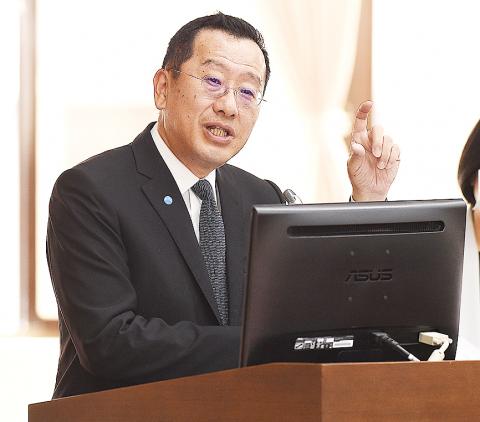The Financial Supervisory Commission (FSC) yesterday said that it has told six local banks to quickly return a total of NT$6.98 million (US$231,932) to their credit card clients for interest rate overcharges on revolving credit.
“It seems that the six banks have a problematic calculating system, and we have requested them to improve their systems,” Koo said during a question-and-answer session at a meeting of the Legislative Yuan’s Finance Committee in Taipei.
He did not name the banks, although Democratic Progressive Party (DPP) Legislator Michelle Lin (林楚茵) urged him to do so, telling lawmakers only that several were privately owned banks.

Photo: Chen Chih-chu, Taipei Times
DPP Legislator Chuang Jui-hsiung (莊瑞雄) said the banks should be penalized by the commission for taking advantage of their clients.
Koo’s comments came after a report from the commission’s Inspection Bureau on Monday said that routine inspections last year found that some banks have been overcharging customers by rounding up their interest rate fees to the nearest integer, instead of rounding them off as stipulated in their credit-card contracts.
Banks are also required to calculate the interest based on each cardholders’ payment deadline, instead of the account closing date, but some have failed to do so and overcharged, the report said.
The six banks would be asked to assign a non-credit card division — such as compliance or information technology division — to set up a new mechanism to confirm that their credit card divisions are doing the calculation correctly, a commission official told the Taipei Times by telephone.
However, cardholders should also pay attention to their bills and calculate the interests themselves to see if they are being charged the correct amount, the official said.
“We still encourage consumers to use credit cards as a payment tool instead of a way to take out a loan, to avoid a heavy financial burden,” the official added.

TAKING STOCK: A Taiwanese cookware firm in Vietnam urged customers to assess inventory or place orders early so shipments can reach the US while tariffs are paused Taiwanese businesses in Vietnam are exploring alternatives after the White House imposed a 46 percent import duty on Vietnamese goods, following US President Donald Trump’s announcement of “reciprocal” tariffs on the US’ trading partners. Lo Shih-liang (羅世良), chairman of Brico Industry Co (裕茂工業), a Taiwanese company that manufactures cast iron cookware and stove components in Vietnam, said that more than 40 percent of his business was tied to the US market, describing the constant US policy shifts as an emotional roller coaster. “I work during the day and stay up all night watching the news. I’ve been following US news until 3am

Six years ago, LVMH’s billionaire CEO Bernard Arnault and US President Donald Trump cut the blue ribbon on a factory in rural Texas that would make designer handbags for Louis Vuitton, one of the world’s best-known luxury brands. However, since the high-profile opening, the factory has faced a host of problems limiting production, 11 former Louis Vuitton employees said. The site has consistently ranked among the worst-performing for Louis Vuitton globally, “significantly” underperforming other facilities, said three former Louis Vuitton workers and a senior industry source, who cited internal rankings shared with staff. The plant’s problems — which have not

TARIFF CONCERNS: The chipmaker cited global uncertainty from US tariffs and a weakening economic outlook, but said its Singapore expansion remains on track Vanguard International Semiconductor Corp (世界先進), a foundry service provider specializing in producing power management and display driver chips, yesterday withdrew its full-year revenue projection of moderate growth for this year, as escalating US tariff tensions raised uncertainty and concern about a potential economic recession. The Hsinchu-based chipmaker in February said revenues this year would grow mildly from last year based on improving supply chain inventory levels and market demand. At the time, it also anticipated gradual quarter revenue growth. However, the US’ sweeping tariff policy has upended the industry’s supply chains and weakened economic prospects for the world economy, it said. “Now

COLLABORATION: Given Taiwan’s key position in global supply chains, the US firm is discussing strategies with local partners and clients to deal with global uncertainties Advanced Micro Devices Inc (AMD) yesterday said it is meeting with local ecosystem partners, including Taiwan Semiconductor Manufacturing Co (TSMC, 台積電), to discuss strategies, including long-term manufacturing, to navigate uncertainties such as US tariffs, as Taiwan occupies an important position in global supply chains. AMD chief executive officer Lisa Su (蘇姿丰) told reporters that Taiwan is an important part of the chip designer’s ecosystem and she is discussing with partners and customers in Taiwan to forge strong collaborations on different areas during this critical period. AMD has just become the first artificial-intelligence (AI) server chip customer of TSMC to utilize its advanced